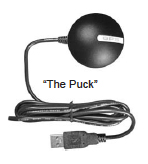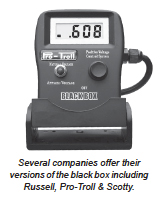New Items to Watch for 2012
Cheap Charts
Do you consider a laptop computer an essential piece of fishing gear? If you answered “no” you may be a member of an endangered species. Mariners are finding laptop computers are increasingly valuable at sea as more and more useful hardware and software hits the market.
 One nifty combination of hardware and software starts with the easy installation of a GlobalSat USB GPS Navigation Receiver ($59.95 retail). As its name implies, you just plug in the USB cable into your laptop. The software comes by accessing an Open Source, free website to access navigational charts – www.opencpn.org.
One nifty combination of hardware and software starts with the easy installation of a GlobalSat USB GPS Navigation Receiver ($59.95 retail). As its name implies, you just plug in the USB cable into your laptop. The software comes by accessing an Open Source, free website to access navigational charts – www.opencpn.org.
Your laptop can now function as a plotter! Murray Pacific got the item 6 months ago ad can’t keep them in the store. TheGlobalSat USB GPS Navigational Receiver is also available at computer stores.
Black Box Electric Fishing
If you want to hear some good descriptions of just how sensitive fish are to electrical currents, talk to Malcolm Russell out of B.C. Russell Electronics is one of the few firms that sell the so-called “black boxes” — devices that can help fishermen control the currents that can actually attract fish. Russell’s father first developed the technology in the 1950’s and is considered a pioneer in the field, which has gained acceptance in both commercial and sport fishing for salmon.
Using black box electric fishing technology involves two main actions. The first is to examine the boat in question and assess the leakages of electricity into the water. The boat can be “electronically cleaned” by isolating sources of this electricity and placing sacrificial anodes at key places on the hull to create an ion stream off the back of the hull.
The second action is to install a black box to be able to tune those currents to the kinds of fish being targeted.
Russell comes to Sitka periodically to assess and make recommendations on local boats. He said king salmon fishermen have to get the correct positive ion charge down to the depth the fish are by using stainless trolling wires that are electrically isolated from the boat.
“The natural — if the sacrificial anodes are working correctly — reading will be high for the king salmon, so we drive it down with the black box, creating a positive ion stream,” Russell said by phone recently. “There will be a ion stream off the stainless steel wire and the fish will sense this field and follow that ion path into the gear.”
He said the technology is attempting to mimic the electrical charge that is given out by the target species’ feed fish.
Russell said the sensitivity of fish to electrical charges is astounding. He said a shark has the capacity — under perfect conditions — to detect a signal from a regular D-cell battery (1.5 volts) from two thousand miles away. He said some catfish fishermen throw batteries in the water to attract their prey to bait placed nearby.
Russell said he can also work at a distance with fishermen looking to try out the technology. He will require a description of the boat and the anodes installed already. Pictures can help, he said. Russell may or may not make it up to Sitka in 2012. He said it depends on the amount of work he has down in Victoria, where he lives.

He said the popularity of black box fishing technology started with the Canadian fleet and has spread since then. There are many fishermen who are not believers, but many others are.
“A few years ago they started to wake up to it,” Russell said. “If they get their boats set up properly they start outfishing guys that were outfishing them before.
Black box units from Russell Electronics and some other companies range from about $150 at the low end to $800 or more at the top end. You can reach Malcolm Russell at his shop at (250) 727-3753 or at his home at (250) 479-7486. You can email him at malcolm_russell@telus.net. For general information, try a web search for “black box electric fishing.”
